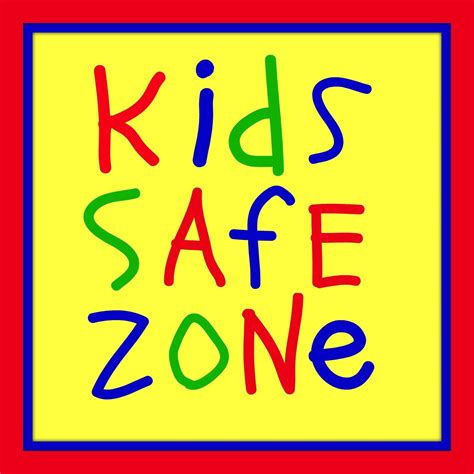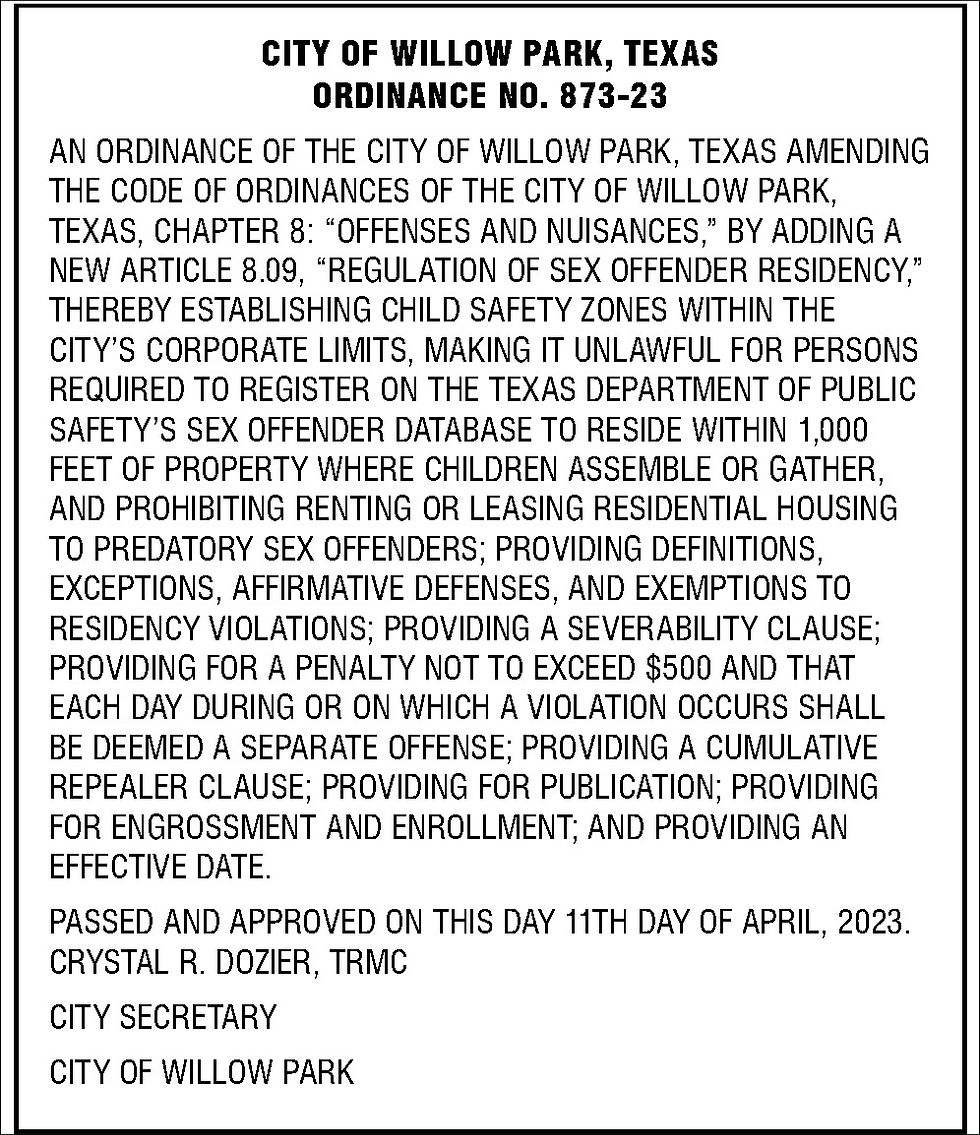
Summary: The City of Willow Park finally has an ordinance designating Child Safety Zones, in which registered sex offenders can not loiter or live.
Latest Update: Wednesday, 12 April, 2023, Thursday, 20 April, 2023
Select #Tags for additional articles: #EMSFirePoliceAmb
New Child Safety Zones ordinance enforcing sex offender laws in Willow Park
Before the 11 April 2023 City Council Meeting, the City of Willow Park had no designated safety zones, in which registered sex offenders could not loiter or live.

During the meeting's Agenda Item 11, the council voted to establish an "ordinance [Article 8.09, “Regulation of Sex Offender Residency] that defines child safety zones and regulates sex offenders, required to register for offenses related to a victim less than 16 years of age, from establishing a permanent or temporary residence within 1,000 feet of the child safety zones."
According the Willow Park Police Chief Franklin there are three (3) registered sex offenders residing in Willow Park, two who have recently moved to Willow Park and one longer-time resident; while one (1) current sex offender registered resident does live inside one of the newly established Child Safety Zones, his residence was established before the ordinance was passed, and so he will not be required to move.
The ordinance creates "areas around locations where children regularly congregate in concentrated numbers and where certain registered sex offenders and sexual predators are prohibited from loitering or establishing temporary or permanent residency; Article 8.09 > Sec. 8.09.001 Definitions > Child safety zone. "A premises where children commonly gather, including, without limitation, a playground, school, day-care facility, video arcade facility, public or private youth center, or public swimming pool, as those terms are defined in section 481.134 of the Texas Health and Safety Code, or other facility that regularly holds events primarily for children, and having the same exclusions as provided by Section 341.906 of the Texas Local Government Code."
Willow Park Civics Research:
21 April 2023 Public Notice in The Community News

• Council approves sex offender ordinance, The Community News, 14 April 2023, Excerpts. The Willow Park City Council voted unanimously to approve an ordinance establishing the regulation of residency for sex offenders at its regular meeting Tuesday, April 11.
The ordinance defines child safety zones within the city. It regulates sex offenders who are required to register for offenses related to a victim less than 16 years of age from establishing a permanent or temporary residence within 1,000 feet of the child safety zones.
Such zones include schools, parks, swimming pools, daycare centers, and playgrounds. Anywhere children younger than 16 could possibly have activities.
In asking the council to approve the ordinance, interim Willow Park Police Chief Daniel Franklin said it will “give a little more protection to children in our community.”
Once the ordinance was approved, Franklin said, "I think it's great. There's several areas in North Texas that have these."
Franklin said violation of the ordinance, a Class C misdemeanor, will carry a fine of up to $500 per day with possible jail time. He added there are some exceptions, such as a minor still living with parents who move into the zone.
Franklin said the city has three registered sex offenders living within its limits, including one who might be in such a zone; that person will be “grandfathered” and not be asked to move. However, if that person moves out of the zone they will not be allowed to move back in.
Texas Department of Public Safety > Texas Sex Offender Registration Program, > Public Sex Offender Registry Search
US Dept. of Justice > National Sex Offender Public Website
US FBI > Safety Resources > Sex Offender Registry
Background on the National Sex Offenders Registry. Our Crimes Against Children Unit at FBI Headquarters coordinated the development of the National Sex Offenders Registry, which is currently managed by the FBI’s Criminal Justice Information Services Division (CJIS). The National Sex Offender Registry is a database available only to law enforcement that is maintained by the FBI’s Criminal Justice Information Services Division.
Laws Governing Sex Offender Registries.
The Pam Lychner Sexual Offender Tracking and Identification Act of 1996 (Lychner Act) requires the Attorney General to establish a national database at the FBI to track the whereabouts and movements of certain convicted sex offenders. The FBI's National Crime Information Center enables the National Sex Offender Registry to retain the offender’s current registered address and dates of registration, conviction, and residence.
The Jacob Wetterling Crimes Against Children and Sexual Violent Offender Registration Program, enacted in 1994, provides a financial incentive for states to establish registration programs for persons who have been convicted of certain sex crimes.
Megan’s Law, enacted in May 1996, amends the Wetterling Program legislation to give states broad discretion to determine to whom notification should be made about offenders, under what circumstances, and about which offenders.
Comments